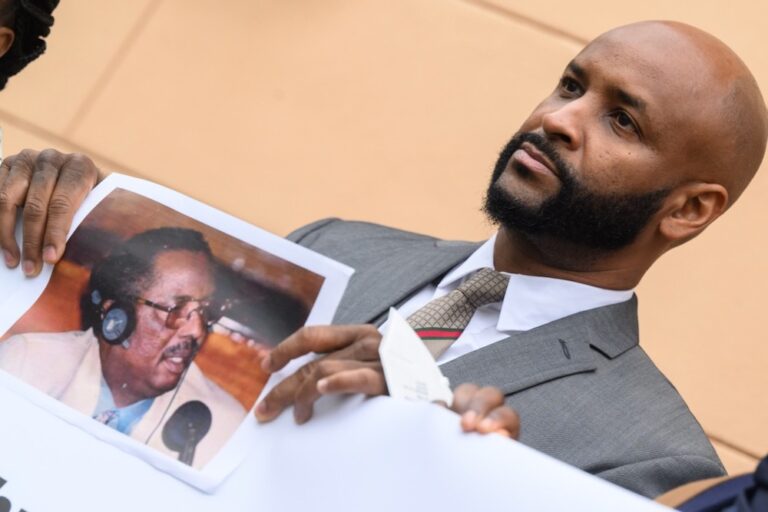Ceesay is facing a possible fine of 50,000 to 200,000 dalasi for allegedly using his mobile phone to send a photo of a gun pointed at President Yahya Jammeh to two women on 16 July.
This statement was originally published on rsf.org on 6 August 2015.
Reporters Without Borders (RSF) is alarmed by the judicial uncertainty hanging over Teranga FM radio manager Alagie Ceesay, who was brought before a Banjul court on a sedition charge on 4 August and again yesterday.
Ceesay had been missing since 17 July before appearing in court on 4 August and, before that, he was held incommunicado for 11 days during the first half of July. His trial is due to start on 18 August.
Ceesay is facing a possible fine of 50,000 to 200,000 dalasi for allegedly using his mobile phone to send a photo of a gun pointed at President Yahya Jammeh to two women on 16 July. Ceesay’s intention was “to raise discontent, hatred and disaffection” among the population,” the prosecution claims.
During the hearings on 4 and 5 August, Ceesay’s lawyer requested his release on bail, as permitted by Gambian law in this kind of case. But bail was opposed by the prosecutor, who said Ceesay might try to escape or obstruct the investigation of a matter constituting a grave threat to national security.
According to his family, Ceesay was held incommunicado at the headquarters of the National Intelligence Agency (NIA) from 2 to 13 July, when he was released without being charged.
His family says he was abducted again by NIA officials four days later, on 17 July, and remained missing for 18 days, until his appearance in court on 4 August. But according to the prosecution, there is no record of his detention during this period. The prosecutor’s office only became aware of his detention on 3 August.
His lawyer said that, under Gambian law, no one may be held for more than 72 hours without being released or taken before a court to be informed of the charges against them. This legal provision was violated twice in Ceesay’s case.
“We are very concerned about Ceesay’s judicial situation and we are very disappointed that the request for his release on bail was rejected,” RSF editor in chief Virginie Dangles said.
“The judicial authorities must respect the provisions of the law. It is very disturbing that the NIA twice detained Sisay in a completely illegal manner for several weeks. We are alarmed by the way this case is developing and we fear a sham trial with the aim of persecuting the manager of a privately-owned radio station.”
The Gambian authorities have been targeting Teranga FM for years and have closed it down three times for varying periods in 2011, in 2013-14 (for 16 months) and in 2015.
Ruled since 1994 by President Yahya Jammeh, who is an RSF “Predator of Press Freedom,” Gambia is ranked 151st out of 180 countries in the press freedom index that RSF published in February.


